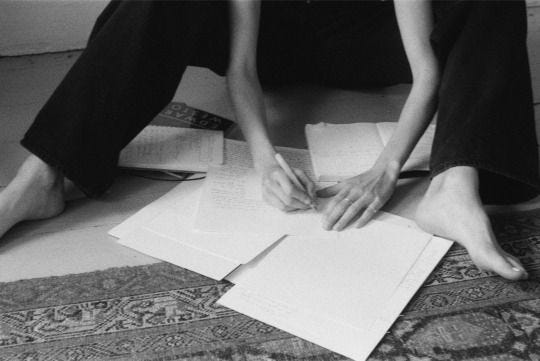2. THE ART OF REALITY & THE REALITY OF ART
On the Artist in Love
Why does one write? I think about this question a lot. I think about why I’m compelled to put words on the page when in life I often have so little to say. Maybe that’s just it: the words my throat tightens around find their escape through my fingers. When I sit at the computer stories emerge faster than I can recall them. But when, lying on his couch one evening, he asked me to tell him a story, I had to apologise: I had nothing. I dove into my mind and found the space uninhabited, the lights out. Everything but a sign declaring, No one lives here. Was the problem me, or was it him?
When he was absent, the world was a dream. I would wake from real life into a sea of absurdities: why should I have to obey my alarm? Why should I have to work? Why am I still trying to write? I had once known a future in which I would write a novel but by then my only future was him. I sat at the computer and thought of his skin.
He was also an artist. While we were together he wrote and re-wrote an entire manuscript; he ruthlessly carved away the excess and sanded it down to something as beautiful and impenetrable as a diamond. I tried tapping on it for weaknesses. I threw it against the wall. With a knife I tried to cut it in half, tried to break it open with a sledgehammer, tried to scratch it with my nails. But the work had denied me. I could not get inside.
While we were together I stared at the pages of my half-written novel. By the end I had deleted them.
The problem, I thought, was that my life had become the work, and the work one of those boring realities we escape through art. Our days and nights together were the chapters and we wrote them with our bodies. We spoke sometimes, but not always. The movement of an arm, the placement of a hand, the shifting of an expression: all were enough. There was so much description that we had little need for dialogue. Sometimes I would try to plan the chapters ahead of time, but as any writer knows it could never work. The story wrote itself.
When he wasn’t around I lived in the pages between chapters. I woke up and worked and ate in a blank space, void of any narrative or impetus. My body moved mechanically. My mind spiralled around prior words. In those moments and hours and days, I could not be sure I existed. What does the character become when the pages stop? A memory? A ghost? Something worse, I decided — they become, once again, just a fiction. I was his invention. I had never been real.
To write my novel was to step into a reality in which he did not exist. I couldn’t bear it. On the days I forced myself to write he seeped in between the lines. All my characters claimed his voice. Their bodies moved as his. Don’t people say that love is inspiration? Love was the obliteration of inspiration. Love whittled my mind down to a single-purpose product. This mind thinks of the man it loves. What else does it do? It takes any thought and makes it about the man it loves. On the shelves of The Mind Store, mine was on sale, reduced further, yours for only $9.99, yours for 99c, yours for FREE. Please, please, take my mind, I will pay you to take my mind.
One day we were walking around his neighbourhood searching for a café and he told me how much he loved writing next to someone else. “You at your laptop, me at mine, both of us just doing our own thing.” But together, I said. “Yeah,” he said, but it sounded like a refutation. “The two of us in the same room.”
I told him it sounded nice but I knew if we ever wrote together only one of us would be writing. I would sit there and tap the keys. Tap, tap, tap. Look at him. Tap, tap, tap. The muscles in his back. Tap, tap, tap. The shape of his arms. Tap, tap, tap. His strong, writing hands.
The thought of him writing pained me. To sit in the same room while he did it would have been excruciating, so in some ways I’m glad it never came to pass. When one writes, one leaves the world — and I am in the world. How good he was at leaving me, even then. He did it every day. He did it for hours at a time. No wonder when the time came for him to really leave me, he did it quickly, smoothly, with the deft strokes of the well-practiced, as though rejection, too, was an art.




read this without reading the previous parts but it’s so gorgeous